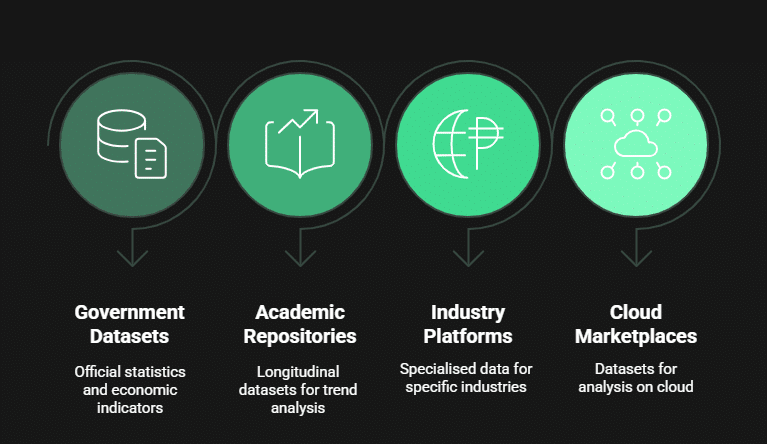Whether you’re conducting market research, developing content strategies, or seeking to understand industry trends, the availability of free data can unlock opportunities that drive measurable business outcomes.
It’s undeniable that data empowers strategic decision-making, fosters innovation and collaboration, and unlocks valuable insights into customer needs.
So what if we told you quality data can be accessed without expensive licensing fees or subscription costs? In our latest article, we introduce you to open datasets and share what we’ve learned about the wild world of free data, not just where to find it but how to evaluate its quality, integrate it into your business processes, and transform raw numbers into strategic advantages.
Key Takeaways
- Government portals like Data.gov and World Bank Open Data provide free access to comprehensive economic, demographic, and industry statistics that typically cost thousands through commercial research firms.
- Cross-validation between multiple free data sources ensures reliability, while systematic quality assessment prevents costly decisions based on outdated or inaccurate information.
- Free datasets serve as powerful foundations for content marketing, enabling businesses to create authoritative, data-driven thought leadership content that drives organic search visibility.
- Cloud-based platforms and API access to government data are making real-time business intelligence possible without expensive infrastructure or subscription costs.
- Strategic application of free data for market research and competitive analysis can accelerate decision-making while reducing research costs by up to 80% compared to commercial alternatives.
What constitutes free data
Free data, often called open data, encompasses datasets that are freely available for anyone to access, use, and share without financial barriers or restrictive licensing. These resources span an extensive range of categories, from government-published statistics and economic indicators to scientific research findings and social demographics.
The scope of free, public datasets continues to expand as governments worldwide embrace transparency initiatives and organisations recognise the value of data sharing. This growth creates opportunities for businesses to access information that supports everything from market entry decisions to customer behaviour analysis.
Business advantages of leveraging open access data
Organisations that can effectively utilise these resources gain access to comprehensive market insights, industry benchmarks, and trend analysis that inform critical business decisions. You can create opportunities to identify market gaps, understand demographic shifts, and monitor competitive landscapes.
Moreover, free data enables rapid hypothesis testing and market validation. Rather than commissioning expensive research studies, you can query existing datasets to validate assumptions or explore new business opportunities. This approach accelerates decision-making while reducing the risk associated with major strategic initiatives.
At Firewire Digital, we help businesses transform raw information into strategic advantages. Our experience working with data-driven marketing campaigns has shown us that the most successful organisations are those that know where to find reliable, free data sets and how to apply them effectively to drive business growth.
Quality considerations for open data
Not all datasets offer the same level of accuracy, completeness, or timeliness, making source assessment a vital component of effective data utilisation.
We suggest developing systematic approaches to evaluating data credibility, examining factors such as the data scientists publishing the data, the methodology used to find the data, and the frequency of updates.
Government sources like national statistical offices typically provide highly reliable data, while academic institutions often offer rigorous, peer-reviewed datasets.
Platforms for accessing free data
Today, numerous platforms offer high-quality, easily accessible datasets. Understanding the strengths and specialisations of different platforms helps you identify the most appropriate sources for your specific business needs.

Government open datasets
Government open data portals represent some of the most comprehensive and reliable sources of free information available to businesses and researchers. Data.gov.au provides Australian government data spanning federal, state, and local levels. This platform provides access to official statistics, economic indicators, education parameters, demographic data, and regulatory information, forming the foundation of many business intelligence efforts.
For businesses operating internationally, exploring similar government portals in your target markets provides valuable local insights, such as the European Union Open Data Portal or Data.gov, the United States’ primary open data portal.
Academic and research data repositories
Academic institutions and research organisations contribute significantly to the landscape of freely available data, particularly in areas related to social sciences, environmental research, and economic analysis. These catalogues often provide longitudinal datasets that support trend analysis and long-term strategic planning.
Harvard Dataverse features research data across multiple disciplines, offering access to datasets used in published academic studies³. Similarly, the Inter-university Consortium for Political and Social Research (ICPSR) maintains one of the world’s largest archives of social science data⁴.
Specialised industry data platforms
Beyond government and academic sources, several specialised platforms focus on specific industries or data types.
The Kaggle site hosts a vast community-driven library of free data sets across topics including finance, retail, healthcare, and technology. For businesses focused on global markets, the World Bank Open Data platform provides economic development indicators, financial statistics, and progress metrics on international development projects. Tableau Public offers both data visualisation tools and access to publicly shared datasets.
Emerging cloud-based data marketplaces
Cloud computing platforms increasingly offer data marketplace services that include both premium and free datasets. AWS Open Data Program makes high-value datasets available for analysis on Amazon Web Services infrastructure. Google Dataset Search functions as a search engine specifically designed to help users discover datasets across the internet.
Future trends in open data accessibility
- Government transparency initiatives: Policymakers worldwide are expanding their open data initiatives, driven by transparency mandates, citizen engagement objectives, and economic development goals. API-based data access and real-time data feeds are making government data more accessible and useful for business applications.
- Private sector data sharing: Private organisations increasingly recognise the strategic value of selective data sharing. Trade associations are developing shared data repositories that provide members access to aggregated industry insights while preserving competitive sensitivities. Technology companies are expanding their open data offerings as part of broader platform strategies.
- Technological enablement: Advances in data processing and analysis technologies are making free data more accessible and useful for business applications. Cloud computing platforms are reducing the technical barriers to working with large datasets. At the same time, AI and machine learning tools enable businesses to extract insights from free data sources that would previously have required specialised expertise or expensive consulting services.
Leveraging free data sets for competitive advantage
Success in leveraging free data requires more than simply knowing where to find information. It demands systematic approaches to data quality assessment, strategic thinking about how data supports business objectives, and consistent methodologies for transforming raw information into actionable insights.
At Firewire Digital, we’ve seen how businesses that effectively combine free data sources with strategic analysis create sustainable competitive advantages.
Whether supporting content marketing initiatives, informing market entry decisions, or optimising operational planning, free data provides the foundation for data-driven business growth. Contact our team to discuss how we can utilise free data insights for your next project.








